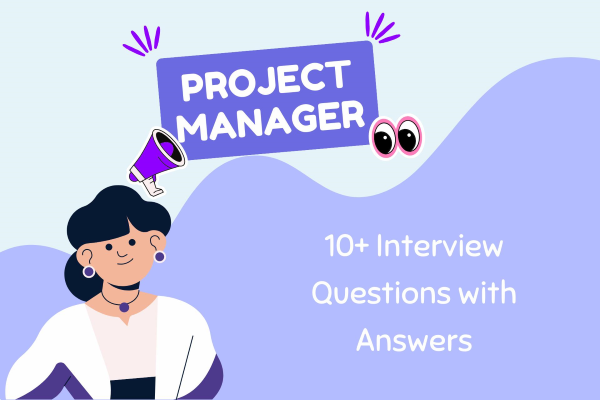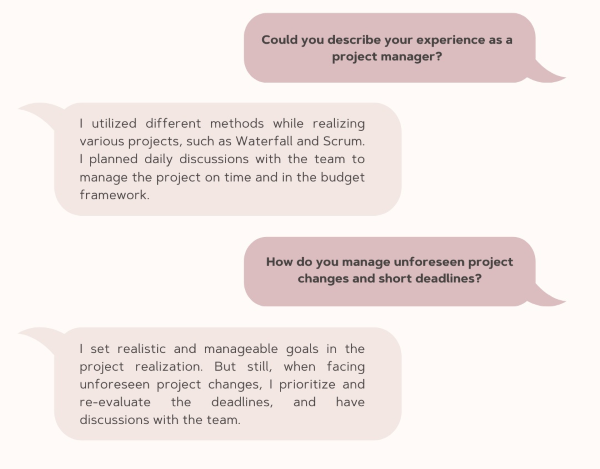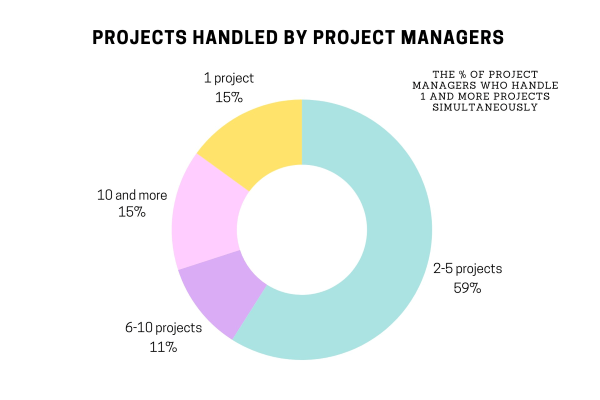Managing a project successfully requires skills and determination. If you want to find out more about project management and its key principles, we are here to help you. In this blog post, you will learn about the skills of a project manager and several project manager interview questions with their sample answers.
What is Project Management and Key Principles of It
Project management requires planning, organizing, and managing all the resources within the required timeline, quality standards, or budget. Project managers coordinate and manage diverse tasks to achieve the project’s desired goals and reach the outcome they want. The importance of project management is obvious. Usually, project management involves sequential processes with planned actions. Those processes include clarifying the objectives of the project and evaluating all the risks. Then, project management requires planning, it includes different aspects of planning, such as organizing the outline of the project, objectives, resources, and so on. The next step requires the implementation of the project. It involves managing different tasks, observing the progress, and resolving issues. The whole monitoring process requires tracking the project’s progress, discovering issues, and resolving them. Finally, the closing of the project requires wrapping up the project and launching the final product or service.

There are several primary principles of project management for successfully realizing the project. Let’s mention the key principles and discuss them.
Fixed Objectives
Carefully and clearly define the main objectives of the project. Objectives should be perceivable, achievable, and manageable in a defined course of time.
Planning
Project planning is very important. Build a project plan that highlights the objectives, resources, tasks, and required timeline.
Stakeholder engagement
To engage possible stakeholders, first, you need to identify them. Then, keep them engaged throughout the whole project lifecycle. Make certain that the project corresponds with their expectations.
Risk management
Throughout the project, you need to identify, measure, and manage possible risks. Build the project plan in a way so you can avoid the negative impact of risks on the project.
Resource management
It is important to manage the resources when planning and executing the project. Resource management includes all kinds of resources, starting from budget, equipment, materials, and human resources.
Team collaboration
Collaboration between the team members is essential for successfully carrying out the whole project. The team members’ roles and duties should be clearly defined and established. Encourage cooperation among team members, so they share their knowledge and support one another.
Time management
Another key principle of project management is time management. The latter should be realistic, clear, and have set achievable deadlines. Additionally, track the progress throughout the project lifecycle to make necessary changes to the schedule.
Constant improvement
Constant learning and improvement will impact the project positively. Encourage continuous improvement and development of the project and learn from the mistakes for current and future projects.
Thus, following the key principles of project management, you are sure to have a well-developed project, successful project planning and execution, and a team ready to cooperate and achieve the objectives in a fixed timeline. The principles mentioned above provide a solid foundation for successful project management.
Project Manager Interview Questions and Answers
Now that you know the key principles of project management, let’s take a look at several project manager job interview questions with their possible answers. Keep in mind that there might be different interview questions for project managers, and below are common examples of them. Thus, here are some project manager interview questions and answers. Whether you are an interviewer who seeks interview questions to ask or an applicant, this list is going to be useful for you.

1. Could you describe your experience as a project manager?
One of the most common questions that you are sure to be asked when applying for a project manager position. Share your previous experience, the projects you worked on, and how you handled them in different challenging situations.
2. How do you manage unforeseen project changes and short deadlines?
When you are asked this kind of behavioral question in an interview, be sure to show your best at handling challenges like unforeseen changes. It is important
for employers how you deal with big projects in short timelines and how you overcome unexpected changes in the project.
3. How do you motivate your team for the project’s successful completion?
One of the best ways of answering this question is ensuring the interviewer that you motivate the team members by setting achievable and clear goals. You can mention that you tend to encourage the team members, highlighting the importance of each person for the project realization.
4. How do you make sure that everyone involved in a project communicates effectively?
You can state that to foster effective communication among all parties of the project you make sure to encourage knowledge-sharing and cooperation.
To ensure smooth communication, you can also make use of technologies like email, project management software, and video conferencing.
5. How do you resolve disputes among team members of the project?
It is beneficial to state that you tend to foster an environment of open communication among team members, actively listening to each individual’s perspective. You can ensure that you try to resolve conflicts and promote teamwork by finding mutually beneficial solutions that drive the project forward.
6. How can project deliverables be made sure they meet the expectations of stakeholders?
When asked a question like this, employers expect you to proactively engage customers during the initial planning stage to guarantee that the project outcomes meet the expectations of stakeholders. This involves gathering their needs and comments throughout the entire project process.
7. Could you describe a situation when you had to lead a project team through a challenging or uncertain phase?
Recount any challenge you have faced while working on your previous project realizations. The employers expect you to share how skillfully you face and overcome uncertain situations, so you can describe the process of resolving unforeseen situations.
8. How can project risks be efficiently identified and decreased?
When asked this kind of question you can state that you make sure the project risks are identified and mitigated effectively by conducting comprehensive risk assessments at the outset of the project, actively tracking and updating the list of risks throughout the project lifecycle, and carrying out active risk reduction.
9. Speak about a moment when you had to guide a group of people through a challenging project phase.
Here make sure to demonstrate how you skillfully guide the team through challenging phases, for instance, in case of a serious technical problem in the implementation phase of a prior project, you assembled a multidisciplinary team of specialists, carried out a root cause analysis, and created a mitigation strategy that included shifting resources, and modifying the project’s schedule.
10. As a project manager, how do you successfully prioritize work and manage your time?
You are likely to be asked a question about how you manage your time and prioritize the work for successfully realizing the project. It will be beneficial to mention that you rank assignments according to their significance, urgency, and effect on the project. Moreover, you can utilize different methods like the Eisenhower Matrix.
11. How do you determine the project’s success?
To provide a good answer you can mention that to enhance progress and offer valuable advice for future projects, you regularly conduct enlightening workshops and thorough evaluations after every completed project.
12. Can you share your techniques for effectively managing project budgets?
A great practice for managing the budget of projects begins with developing a broad-based budget plan that includes all potential expenses such as labor, materials, equipment, and costs.
13. How can project team members be encouraged to collaborate and work as a team?
When a question like this comes up during an interview, you can point out that you do this by promoting open communication and knowledge sharing, creating a welcoming and inclusive team environment, and giving opportunities for development and advancement to boost cooperation and collaboration.
14. Which part of project management do you consider most complicated, and how do you overcome it?
A possible answer that will leave the interviewers pleased is managing stakeholder expectations and balancing opposing goals and interests. To overcome this obstacle, you can place a high value on open and honest communication, actively involve stakeholders at every stage of the project, and guarantee that the project’s aims and objectives are met.
15. How do you guarantee project quality assurance? What actions do you take?
A good way to have a high-quality project and ensure the project quality assurance, you establish quality standards at the outset of the project, and carry out regular quality assessments throughout the whole project. You can highlight that you implement quality assurance processes such as review by others, evaluation, and confirmation to identify and address flaws or mistakes quickly.

Thus, we have mentioned some of the project manager interview questions that are common with their answers. The questions will help you understand what skills are a priority for a good project manager, as there can be behavioral, technical, and situational questions for interviews. Besides knowing the possible interview questions and answers, let’s also take a look at the top project manager skills list.
Key Skills of a Project Manager
Now, that you are aware of the possible questions of a project manager interview let’s also discuss the key skills that a good project manager should possess. Generally, technical project manager interview questions are asked to evaluate the level of possession of project management skills of candidates.
- Communication Skills
One of the primary skills and traits of a good project manager is the ability to communicate effectively and possess strong communication techniques, perceive information, and negotiate with team members and colleagues.
- Problem-Solving Skills
Having strong problem-solving skills is vital for a good project manager, to easily identify issues, evaluate them, and quickly find effective solutions to those flaws. Meanwhile, the project manager should keep the project on track.
- Leadership Skills
Leadership skills are essential for a project manager to motivate and direct the team members, resolve conflicts, and make decisions.
- Financial Management Skills
The project manager should possess strong financial management skills, and be aware of the project finances, and costs. It’s essential to have the budget of the project skillfully planned to avoid mistakes.
- Team Management Skills
To have a successful project, the project manager should be able to manage the team and encourage knowledge-sharing and cooperation among team members.
Conclusion
In conclusion, we found out what is project management and what are its key principles that lead to successful project realization. Explore the project manager interview questions with their answers, so you can learn more about the key project management skills and understand what are the requirements for a good project manager.